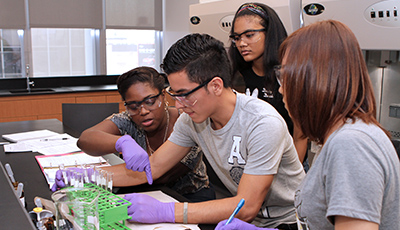
New Study Shows John Jay PRISM Program Has Increased Graduation Rates and STEM Careers for Science Majors
September 8, New York, NY – A new study in the Journal of Research in Science Teaching, led by Anthony Carpi, Professor of Environmental Toxicology and Dean of Research at John Jay College of Criminal Justice, shows that undergraduates who participate in the College’s Program for Research Initiatives in Science and Math (PRISM), graduate more often with science degrees and attend graduate school and pursue STEM careers at higher rates.
Graduation rates among John Jay science majors have nearly tripled since the implementation of PRISM – an undergraduate research experience (URE) program. The extensive case study also found that the number of students pursuing graduate degrees has grown nearly ten fold and that students receive author credit on journal articles more often than at other institutions. Furthermore, John Jay has seen a growth in both external funding and in full-time faculty focused on STEM research.
Established in 2006, PRISM enables undergraduates to carry out guided scientific research. Although undergraduate STEM research has been popular de rigueur at major research universities, public Minority- and Hispanic-serving institutions like John Jay have historically struggled to provide their students with equivalent experiences and to keep them competitive with their majority peers. Tailored to students and faculty, PRISM has benefited both participants and the college.
“We were delighted to see the impact that undergraduate research experiences have on our students’ career plans. John Jay has a robust and diverse pipeline of students moving on to post-graduate professional careers in STEM fields, and it is exciting to see these students becoming skilled scientists,” said Carpi.
To reach these conclusions, researchers made use of institutional and program data collected over three years, interviews and focus groups, and surveys. Notably, the study found that PRISM positively affected students’ decisions to pursue graduate degrees and STEM careers, impacting Black and Hispanic participants more significantly than their White and Asian counterparts.
Norman Lederman, Distinguished Professor of Mathematics and Science at the Illinois Institute of Technology, said, “It has long been known that actual research experiences in science and mathematics impact students' attitudes toward science and mathematics as well as the STEM career aspirations of pre-college and college students. It has also been known that under represented students tend to select themselves out of STEM fields for a variety of social and cultural reasons. The PRISM program at John Jay College has produced extremely compelling results and it serves as an impressive model for other universities, especially those that do not initially have high-level research profiles.”
This study represents the initial stage of a multi-pronged evaluation of John Jay’s URE program with subsequent phases focusing on quantitative comparisons. For now, PRISM appears not only to redress some of the education and employment inequities faced by minority students, but also to serve as an example to other institutions that wish to send more underrepresented students into the STEM workforce.
The authors of the study included Nathan Lents, Professor of Molecular Biology and Director of the Honors College at John Jay College, Heather Falconer of Northeastern University, and Darcy Ronan of John Jay College and the CUNY Research Foundation. To read the study, visit Wiley Online Library.
About John Jay College of Criminal Justice: An international leader in educating for justice, John Jay College of Criminal Justice of The City University of New York offers a rich liberal arts and professional studies curriculum to upwards of 15,000 undergraduate and graduate students from more than 135 nations. In teaching, scholarship and research, the College approaches justice as an applied art and science in service to society and as an ongoing conversation about fundamental human desires for fairness, equality and the rule of law. For more information, visit www.jjay.cuny.edu.
The City University of New York is the nation’s leading urban public university. Founded in New York City in 1847, the University comprises 24 institutions: 11 senior colleges, seven community colleges, and other professional schools. The University serves nearly 275,000 degree-credit students and 218,083 adult, continuing and professional education students.



